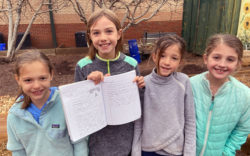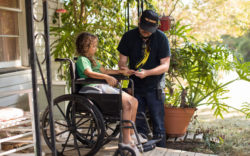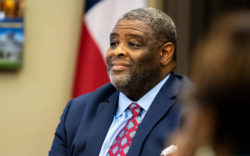Lunchtime is a bit frazzling at Fowler Drive Elementary. In years past, first-grade paraprofessionals would step in for the teachers to keep the 6- and 7-year-olds in their seats and focused on eating—not chatting with their friends—while their teachers had a chance to eat their lunch or take a bathroom break.
Faced with austerity cuts from the state legislature and declining local tax revenue, the Clarke County Board of Education voted in June to cut $7 million from its budget, including $1.5 million saved by eliminating 32 first-grade and 16 media center parapros, along with some special education teachers, speech pathologists, a social worker, a psychologist and a nurse. Now, at Fowler Drive and at elementary schools across Clarke County, the behind-the-scenes jobs done by the parapros fall to other staff members.
As the schools settle into a new year, both staff and students find themselves adjusting to the loss of parapros, with tasks such as making copies or preparing parent handouts taking away from instruction time. As a result, the school board launched a new program this fall to specifically reach out to the community for volunteers to help fill the gaps. The needs are varied depending on the school, but often something as simple as an hour a week spent at the copy machine for teachers can help lighten the load. The volunteer outreach initiative was specifically set up to find volunteers for first-grade classrooms and in school media centers, says Anisa Sullivan Jimenez, director of public relations and communications for the county school district. Prospective volunteers can sign up at a school or they can visit the district’s website at www.clarke.k12.ga.us and click on “Volunteer: Make a Difference” to find a list of school contacts. Volunteers must pass a background check, per district requirements.
Jimenez stresses that volunteering doesn’t have to be a specific time commitment each week. And school officials added that often it’s after-hours events or school functions when the most help is needed. “This is so open and flexible, and even if they have an hour one week, we would love to place them according to their schedule,” she says. “All it takes is one hour to make a difference in the life of a child.”
At Stroud Elementary School, for example, school counselor Fraser Kent says their biggest need is in the media center. Along with leading lessons, helping students research and guiding them to the right books, the media center teacher now has to spend time re-shelving books, which was once a job a parapro took care of. “Both our teachers and our librarian are super open to any help,” Kent says. “Some of it’s just having an extra set of hands in the classroom. Teachers try to work in interactive activities and with an extra set of hands, that really helps what they can do.”
Parapros do more than assist the teacher, Kent says. They are among the staff members who work throughout the day to make sure kids are getting to the right classrooms, making sure they finish their lunch or shepherding them through the car-pool line.
“All the things that help a school run smoothly are all the things parapros helped us do. They, in so many instances, are our extra set of hands,” she says. “And especially in the classrooms, they function as another teacher in the classrooms. That’s definitely a hole in our building this year.”
As Fowler students crowded the cafeteria during a recent lunch, school counselor Cheryl Sewell and family engagement specialist Alex Pena noted how staff members, including the principal and vice principal, are taking turns monitoring the kids so the teachers can get a short break. Because the school’s first-grade parapros also helped in the computer lab and other areas, the staff is squeezed even more.
The school has plenty of opportunities to volunteer among the water, land and solar-system motifs decorating each hall, Pena says. (And don’t miss the garden where reclaimed rainwater is used to flush toilets.) Forty percent of the school’s population is native Spanish speakers, so there is always a need for translators, whether it’s at an after-school activity or during the day, translating take-home sheets for parents. “Even if we had a list of on-call volunteers, we can call them when we have an event and need help,” Pena says.
That’s also an opportunity for University of Georgia students to brush up on their bilingual skills, she says. Jimenez added that the school district also is reaching out to UGA and the Athens Area Council on Aging for volunteers as well. “Children love to have people come in and read to them,” Pena says, or volunteers can sign up to be a “reading buddy,” which is where a student reads to someone else. “And also there are a lot of jobs that teachers have to work so many hours—cutting, doing copies—that is part of their job as well.”
Like what you just read? Support Flagpole by making a donation today. Every dollar you give helps fund our ongoing mission to provide Athens with quality, independent journalism.










